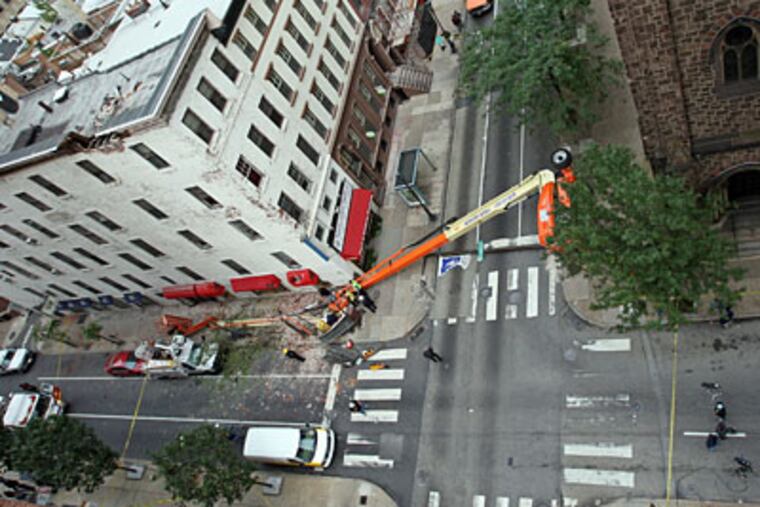Fatal lift accident might involve infractions
Federal regulations for the type of aerial lift that toppled into a busy Center City intersection Monday say the machine should not be moved while the arm is extended and people are inside the basket.

Federal regulations for the type of aerial lift that toppled into a busy Center City intersection Monday say the machine should not be moved while the arm is extended and people are inside the basket.
Police and witnesses say that's exactly what the lift operator did while performing a survey of the stone exterior of First Presbyterian Church.
As he moved the machine from his perch 125 feet above the pavement, one of the lift's wheels rolled onto a sidewalk utility panel, which gave way under the weight. The lift swayed and then crashed to the street, scraping an apartment building and demolishing a streetlight on the way down.
The lift operator, James Wilson, 41, of Franklinville, was killed, and several bystanders on the ground were injured by falling debris.
Wilson's employer, Brent Schopfel, said he doubted that the experienced lift operator would have violated the safety standards. There was an employee on the ground, but he had gone around the corner to check on another lift working at the church.
"I can't be certain of anything, but the guy on the ground does not believe he was moving," said Schopfel, president of Masonry Preservation Group in Merchantville. "Jimmy was very into safety. He trained a lot of our younger guys."
Newer lifts have a safety mechanism that prevents them from moving while the arm is extended, but Wilson was operating an older model that did not have that feature, Schopfel said.
Wilson, who had worked at the company for more than 20 years, was one of a minority of employees comfortable working as high as 200 feet in the air, he said.
"Some guys just can't do it," Schopfel said.
The federal Occupational Safety and Health Administration, which sets regulations for aerial lifts, is investigating the accident. The company is cooperating, Schopfel said.
"We looked at the equipment, we've been interviewing people," said Al D'Imperio, director of OSHA's Philadelphia area office. "We will also look at the ground . . . and at the training of employees. We are going to do fact-finding."
The fiberglass-reinforced concrete panel that gave way under the weight of the lift covered a Comcast node that provides access to cables in the street. The panels are common throughout the city, and they are not designed to withstand something as heavy as an aerial lift, city officials said.
Streets Commissioner Clarena Tolson said yesterday that it would be the responsibility of the equipment operator to note something like a cable-access cover.
"You have vents, utility covers. . . . All those things are things an operator of equipment would pay attention to, and do something to remedy," she said.
For instance, an equipment operator could cover the panel with a metal plate, she said.
Schopfel said he was still trying to make sense of the accident.
"We still don't know exactly what Jimmy was doing at the time of the accident," he said. "The one wheel on the Comcast box, we have no idea how long it was there. It could have been 10 minutes or four hours."
Mayor Nutter's office said yesterday that the masonry company lacked two necessary permits - one to close the sidewalk and one to close a lane of traffic on Walnut Street.
Workers did close the sidewalk, despite not having a permit to do so, but did not close a lane of traffic, as they should have, the mayor's office said.
The company could face a minimum fine of $250, said Maura Kennedy, a spokeswoman for the mayor.
Masonry Preservation, which has about 60 employees, does extensive work in the Philadelphia area and boasts of numerous high-profile restoration jobs on historic buildings.
The company has shut down all its projects pending a review by company managers, Schopfel said.
Wilson's relatives gathered at his Franklinville home yesterday afternoon, but a young man at the home asked a reporter to give the family privacy.
Wilson had moved to the neighborhood from Philadelphia a couple of years ago and was well known by neighbors, said Michele Price, who lives across the street.
"When he first moved here, he had tickets to the Phillies game, and he gave them to us," she said. "It was our first time going to the new stadium. That was the kind of guy he was."
Wilson lived with his wife and daughter, a senior at Delsea High School, Price said. She would often see him outdoors, working in the garden or tackling one of the numerous projects on their Victorian-style home.
Schopfel also said Wilson was close with many of his coworkers, who were left numb by the tragedy.
"I cried like a baby on the way home yesterday, once there wasn't anything left to do," he said. "I turned on the Phillies game. I know Howard hit something, but I'm not sure what. I just kept replaying the accident over and over in my head."